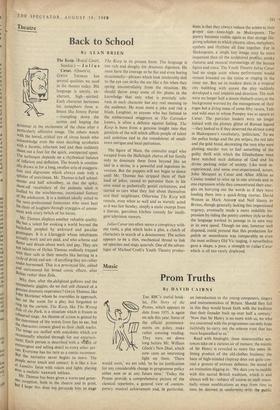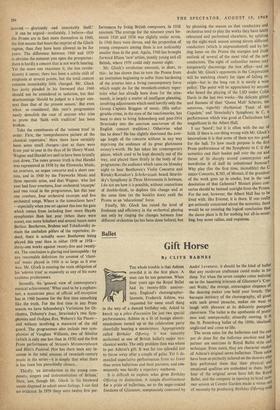M us ic
Prom Truths
CAIRNS By DAVID an introduction to the young composers, Singers and instrumentalists of Britain. Should they fail in this they would break faith with the tradition that their founder built up over half a century.' 'Now that Sir Henry is no more with us, we who are concerned with the programmes can only hope faithfully to carry out the solemn trust that has been bequeathed to us.'
Read with hindsight, these statesmanlike sen- tences take on a curious air of menace; the mantle of Sir Henry is revealed as more like some ill- fitting product of the old-clothes business; the haze of high-minded claptrap does not quite con- ceal a gesture of anxious defiance, the sound of an institution digging in : 'We dare you to meddle with this sacred British tradition, which is and always will be—subject oT course to such essen- tially minor modifications as may from time to time be deemed in conformity with the public interest — gloriously and immutably itself.' It can be argued—irrefutably, I believe—that the Proms are in fact more themselves in 1960, the first season that bears the imprint of the Glock regime, than they have been allowed to be for years. The difference between 1960 and 1959 is obvious the moment you open the prospectus: there is hardly a concert that is not worth hearing. Yet the more one examines it, the less revolu- tionary it seems; there has been a subtle shift of emphasis at several points, but the total content remains remarkably little changed. Mr. Glock has justly pleaded in his foreword that 1960 should not be considered in isolation, but that shortcomings 'should be judged in a larger con- text than that of the present season.' But even when so considered, this year's programmes easily demolish the case of anyone who tries to prove that 'faith with tradition' has been broken.
Take the constituents of the 'solemn trust' in order. First, the 'comprehensive picture of the classical repertoire.' Here there have certainly been some small changes—just as there were from year to year in the days of Sir Henry Wood. Wagner and Handel are said to have been brutally cast down. The more prosaic truth is that Handel was represented in 1958 by the Fireworks Music, an overture, an organ concerto and a short can- tata, and in 1960 by the Fireworks Music and three operatic arias, and that Wagner, who last year had four overtures, four orchestral 'excerpts' and two vocal in the programmes, has this year one overture, four orchestral excerpts and five orchestral songs. Where is the iconoclasm here? —especially when you set against this loss the gain which comes from including four more Haydn symphonies than last year (when there were none), one more Schubert and several hours more Berlioz. Beethoven, Brahms and Tchaikovsky re- main the unshaken pillars of the repertoire; in- deed, there is actually more Beethoven being played this year than in either 1959 or 1958— thirty-one works against twenty-five and twenty- six. The conclusion is glaring and inescapable: by any reasonable definition the amount of 'classi- cal' music played in 1960 is as large as it ever was; Mr. Glock is meeting the main obligation of his 'solemn trust' as massively as any of his more cautious predecessors.
Secondly, the 'general view of contemporary musical achievement.' What used to be a euphem- ism, a monstrous piece of official self-exception has in 1960 become for the first time something like the truth. For the first time in any Prom season we have Schoenberg's Variations for Or- chestra, Debussy's Jeux, Stravinsky's two Sym- phonies and Oedipus Rex, Webern's Six Pieces— and without involving a massacre of the old guard. The programmes also include two sym- phonies of Vaughan Williams, two of Sibelius (which is only one less than in 1958) and the first Prom performance of Strauss's Metamorphosen and Bliss's Pastoral. Nor has there been any in- crease in the total amount of twentieth-century music in the series—it is simply that what there is has been less parochially chosen..
Thirdly, 'an introduction to the young com- posers, singers and instrumentalists of Britain.' Here, too, though Mr. Clock in his foreword seems disposed to admit some failings, I can find no evidence. In 1959 thqe were twelve first per- formances by living British composers, in 1958 nineteen. The average for the nineteen years be- tween 1920 and 1938 was slightly under seven. In 1960 there were eleven, and the proportion of young composers among them is not noticeably smaller than in the past. Again, 1960 has brought forward fifteen 'new' artists, mostly young and all British, where 1959 could only muster eight.
Mr. Glock's revolution amounts, in short, to this : he has shown that to turn the Proms from an institution beginning to suffer from hardening of the arteries into a living contemporary force which might do for the twentieth-century reper- toire what has already been done for the nine- teenth, is largely a matter of intelligent planning, involving adjustments which need horrify only the Group Captain Briggses of music. (His unfor- givable crime, in the eyes of the reactionaries, has been to dare to bring Schoenberg and post-1914 Stravinsky into the sanctum sanctorum of the English concert tradition.) Otherwise what has he done? He has slightly shortened the aver- age length of the concerts without in any way depriving the audience of its great gluttonous money's-worth. He has taken his contemporary pieces, which used to be kept decently out of the way, and placed them firmly in the body of the programme; the audience which came on Monday night to hear Beethoven's Violin Concerto and Rimsky-Korsakov's Scheherazade heard Stravin- sky's Symphony in Three Movements in between. I do not see how it is possible, without contortions of double-think, to deplore this change and at the same time (as the booklet does) exalt the Proms as an 'educational' force.
Finally, Mr. Glock has raised the level of freshness and efficiency in the orchestral playing not only by ringing the changes between four different orchestras (as has been done before), but by planning the season so that conductors and orchestras tend to play the works they have lately rehearsed and performed elsewhere, by splitting up the eight-week season among eleven different conductors (which is unprecedented) and by let. ting loose on the Proms the energies and fresh outlook of several of the most vital of the near conductors. The sight of unfamiliar names may temporarily discourage the box office—and no doubt Mr. Glock's opponents in the Corporation will be watching closely for signs of falling re. ceipts—but in the long run it is surely a wise policy. The point will be appreciated by anyone who heard the playing of the LSO under Colin Davis in the last two weeks—the delicate glittet and fineness of their 'Queen Mab' Scherzo, the sonorous, superbly rhythmical 'Feast of the Capulets,' and Stravinsky's Symphony in C, a performance which was good at Cheltenham but magnificent in the Albert Hall.
I say 'heard'; but it is often with the ear of faith. If there is one thing wrong with Mr. Glock's innovations it is that some of them are too good for the hall. To how much purpose is the first Prom performance of the Symphony in C if the acoustics cast their leaden pall over the cut and thrust of its sharply scored counterpoint and bowdlerise it of half its unbuttoned humour? Why play (for the first time, incredibly) the C major Concerto, K503, of Mozart, if the grandeur of the work goes up in smoke, lost in the vasi desolation of that Gehenna? Mozart piano con. certos should be banned outright from the Proms For the rest, however, the Albert Hall has to be lived with; like Everest, it is there. If one real', got seriously concerned about the acoustics, there would be no resisting the logical conclusion that the damn place is fit for nothing but all-in-wrest ling, boy scout rallies, and requiems.



































 Previous page
Previous page